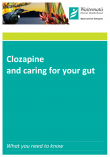You can now add Healthify as a preferred source on Google. Click here to see us when you search Google.
Clozapine
Sounds like 'KLOE-za-peen'
Key points about clozapine
- Clozapine is used to treat schizophrenia.
- Clozapine is also called Clopine® or Clozaril®.
- You will need to have regular blood tests while taking clozapine because it can affect your neutrophils (white blood cells).
- Find out how to take it safely and possible side effects.

Clozapine is used to treat schizophrenia. It doesn't cure this condition, but is used to help ease the symptoms, such as hearing voices (hallucinations), ideas that distress you and don't seem to be based in reality (delusions) and difficulty in thinking clearly (thought disorder).
Clozapine is used if you've tried at least 2 other antipsychotic medicines and found they didn't work well enough or you have difficulty managing side effects with other antipsychotics.
Clozapine belongs to a group of medicines called antipsychotics. Read more about antipsychotic medication.
Blood tests and other checks
You will need to have regular blood tests while taking clozapine because it can affect your neutrophils. These are white blood cells that help to fight infections and keep your immune system healthy.
- For every 100 people taking clozapine, 3 people will get a drop in the number of neutrophils. This can lead to a condition called neutropenia or a more severe reduction in your white blood cells called agranulocytosis. A drop in neutrophils puts you at greater risk of picking up infections. Read more about neutropenia.
- You need to get your white blood cell count checked with regular blood tests because you may not notice any symptoms until you have an infection.
- Checking your white blood cells regularly helps to find any changes before problems occur.
- Clozapine can only be dispensed from certain pharmacies. You won’t be allowed to collect clozapine unless you have an up-to-date blood result so the pharmacist can check your neutrophils and be sure that clozapine is safe for you.
- You will need to have a blood test within 10 days before starting clozapine and every week for the first 18 weeks of treatment. Then you'll need to have blood tests every 4 weeks while you are taking clozapine.
Other tests
Your healthcare provider will also check for any changes caused by clozapine to your heart, blood glucose and cholesterol levels. You will have your weight, blood pressure, liver and kidney function checked regularly. You may need an ECG test to check your heart rate.
Be aware of things that can affect your clozapine levels
Clozapine levels can be affected by a variety of factors, including your lifestyle and other medicines. A blood test can be done to check your clozapine levels. If they're too low, the medicine may not be working well enough, if your levels are too high, you're at an increased risk of side effects.
Here are some things that can affect your levels.
- COVID-19 virus: If you test positive for COVID-19 you'll need to have both your blood level of clozapine and a full blood count (FBC) checked. You may need to have your blood tested from home, talk to your healthcare provider.
- Taking other medicines: Clozapine interacts with a number of medicines especially hormonal contraceptives, some antibiotics, anti-seizure medicines, antidepressants and antihistamines. Check with your healthcare provider before starting clozapine and before taking any new medicines. Your dose of clozapine may need to be adjusted.
- Herbal supplements, rongoā Māori and medicines that are available without a prescription: Check with your healthcare provider or pharmacist before starting any new products.
- Smoking, but not nicotine replacement therapy or vaping: If you start or stop smoking, or change the number of cigarettes you're smoking, tell your healthcare provider immediately. Smoking affects the way your body breaks down (metabolises) clozapine. Your dose of clozapine may need to be adjusted. If you’d like to stop smoking, your healthcare provider can plan a smoking cessation programme with you.
- Caffeine can affect the levels of clozapine in your blood. Don't change how much caffeine you have without talking to your healthcare provider. Sources of caffeine include coffee, cola and energy drinks. Sudden changes in your caffeine intake can alter (increase or decrease) the levels of clozapine in your blood. This can be harmful.
In Aotearoa New Zealand, clozapine is available as tablets which come in different strengths: 25 mg, 50 mg, 100 mg and 200 mg. Liquid is available as 50 mg in 1 mL strength. A 20 mg in 1 mL strength can be made by your pharmacist but it isn't paid for by the government.
The dose of clozapine is different for different people, depending on your response. You will be started you on a low dose which will be increased slowly as your body gets used to it. The following is a guide.
- Day 1: Start with 12.5 mg once or twice a day.
- Day 2: Increase to 25 mg once or twice a day.
- Over the following 2 to 3 weeks: Your dose will be increased gradually by 25 to 50 mg a day, until you're taking the dose that will give you the most benefit. This is usually 200 to 450 mg a day but can be up to a maximum of 900 mg per day.
Always take your clozapine exactly as your prescriber has told you
- Dose increases may vary depending on your response to treatment and your medical history.
- After a while, your healthcare provider might also recommend reducing your dose, depending on how you respond to clozapine.
- The pharmacy label on your medicine will tell you how much clozapine to take, how often to take it and any special instructions.
- Keep a record of when to take your doses on a medicines list. [PDF, 54 KB]
- Don't stop taking or reduce the dose of clozapine without talking to your prescriber first. If you do stop or reduce your dose of clozapine, the dose will have to be lowered gradually over several weeks.
Timing
- Clozapine is usually taken 2 times a day. However, if your total daily dose is 200 mg or less, you may be able to take the whole amount in a single dose, usually in the evening. Try to take your clozapine dose(s) at the same times each day.
- You can take clozapine with or without food.
- Swallow clozapine tablets with a full glass of water. You can take clozapine liquid alone or in water. Shake the clozapine bottle for 10 seconds before you measure your dose.
- Keep taking clozapine every day. It usually takes a few weeks to start working and it can take a few months before you feel the full benefits.
If you forget to take your dose
- 1 missed dose: If you forget to take your dose, take it as soon as you remember. But if your next dose is due within the next 4 hours or sooner, just take the next dose at the right time. Don't take double the dose.
- More than 1 missed dose: If you forget to take clozapine for more than 48 hours, you must contact your healthcare provider or clinic straight away. To stop unwanted side effects your dose may need to be adjusted before you re-start. Don't start taking clozapine again before you talk to your healthcare provider.
- See tips to help you remember to take your medicines regularly.
Plan ahead – don't run out of tablets
- Plan ahead for public holidays and travel so you don’t miss your blood tests or run out of clozapine. Your pharmacy can only give you enough clozapine until the next blood test date.
Here are some things to know when you're taking clozapine. Other things may be important as well, so ask your healthcare provider what you should know about.
- Stay on the same brand of clozapine: There are 2 brands available in Aotearoa New Zealand Clopine® or Clozaril®. It’s important not to swap brands without talking to your healthcare provider.
- Driving: Be careful when driving or using tools until you know how this medicine affects you.
- Clozapine can make you sweat less: Take care in hot environments or when doing lots of exercise as you can overheat.
Prevent constipation and maintain a healthy gut
Constipation is when your bowel movements (stool or poo) become hard and lumpy, making them painful or difficult to get out. Constipation is a very common side effect of clozapine (up to 8 in every 10 people taking clozapine get constipated) and can lead to serious, life-threatening bowel problems.
It's very important to prevent constipation by increasing fluids and fibre in your diet and exercising regularly. Most people will also be prescribed laxatives to prevent constipation while they're taking clozapine.
You're at increased risk of constipation:
- during the first 4 months of starting clozapine
- if you have an increase in your clozapine dose
- if you're taking other medicines that are likely to cause constipation, including those you can buy over the counter without a prescription
- if your diet changes
- if you stop smoking.
Read more about clozapine and caring for your gut(external link).
Limit or avoid alcohol
Avoid alcohol while you're taking clozapine, especially when you first start treatment.
- Drinking alcohol while taking clozapine can cause drowsiness and affect concentration, putting you at risk of falls and other accidents.
- It can also cause agitation, aggression and forgetfulness.
- If you do drink alcohol, drink only small amounts and see how you feel. Don't stop taking your medicine.
Pregnant, planning a pregnancy or breastfeeding
- While you're taking clozapine, use effective contraception to avoid getting pregnant. If you would like to become pregnant, talk to your healthcare provider.
- If you become pregnant, tell your healthcare provider immediately.
- If you want to start breastfeeding your pēpi, talk to your healthcare provider. Clozapine may pass into breast milk and affect your baby.
Like all medicines, clozapine can cause side effects, although not everyone gets them. If you're concerned about any symptoms you think might be related to your medicine, talk to your healthcare provider. The following information offers some guidance but doesn't include all possible side effects.
Common side effects
Tell your healthcare provider if these side effects bother you
- Feeling sleepy, drowsy, tired. This can last a few hours after the dose. Don't drive or use tools or machinery. Avoid drinking alcohol and take special care to avoid a fall.
- Changes in movement, such as feeling shaky and restless (can't sit still). Your eyes or tongue may move on their own. It's not dangerous but is a well-known side effect. Read more about medicines and movement side effects.
- Increased saliva (spit) production and drooling. This isn't dangerous, but it can be upsetting. Your healthcare provider may be able to give you a medicine to help this.
- Increased appetite, which can lead you to overeat and gain weight. A diet with plenty of vegetables and fibre may help prevent weight gain. Limit sugary or fatty foods. and exercise regularly. Learn more about controlling your appetite when you're taking antipsychotic medications.(external link)
- Problems passing urine (wee) causing you to wet the bed at night. Limit your fluid intake during the evening and go to the toilet to empty your bladder before bedtime. Another medicine may be prescribed to help with this.
Tell your healthcare provider immediately or phone Healthline free on 0800 611 116 if these occur
- Symptoms of constipation such as fewer bowel movements than usual or not having a bowel movement for 2 days or more, passing hard or dry poos, tummy pain, bloating or gas in your tummy, nausea (feeling sick) or vomiting (being sick), reduced appetite, or diarrhoea (runny poo), especially if bloody. Diarrhoea can also be a symptom of constipation.
- Signs of infection such as fever, cold or flu symptoms, muscle aches, headache, or sore throat. Clozapine can affect your white blood cells which fight infection (a condition called neutropenia). This can put you at greater risk of picking up infections. Contact your healthcare provider for an urgent blood test to check your white blood cells. Read more about neutropenia.
- Signs of problems with your heart (called myocarditis) such as sudden tiredness, shortness of breath, difficulty breathing, fever, chest pain or fast heartbeat even when you're resting.
Read more about medicines and side effects and reporting a reaction you think might be a side effect.
The following links have more information on clozapine.
Med-ucation medication benefits and side effects(external link) Talking Minds, NZ
Clopine(external link) Medsafe Consumer Information, NZ
Clozaril(external link) Medsafe Consumer Information, NZ
Brochures
Clozapine under the care of your GP [PDF, 386 KB] Health New Zealand | Te Whatu Ora Waitematā
Clozapine and caring for your gut [PDF, 680 KB] Health New Zealand | Te Whatu Ora Waitematā
Controlling your appetite when you are taking antipsychotic medications(external link) Health New Zealand | Te Whatu Ora Auckland
5 questions to ask about your medications(external link) Health Quality and Safety Commission, NZ English(external link), te reo Māori(external link)
References
- Clozapine(external link) NZ Formulary
- Clozapine: safe prescribing(external link) BPAC, NZ, 2018
- Clozapine quick reference – information for doctors(external link) Canterbury DHB, NZ, 2022
- Clozapine patient information(external link) Hillmorton Hospital Pharmacy, NZ, 2021
- Versacloz suspension(external link) Medsafe, NZ, 2021
Brochure

Clozapine and caring for your gut
Health New Zealand | Te Whatu Ora Waitematā

Clozapine under the care of your GP
Health New Zealand | Te Whatu Ora Waitematā

Controlling Your Appetite: When You are Taking Antipsychotic Medications
Health New Zealand | Te Whatu Ora Auckland
Credits: Healthify editorial team. Healthify is brought to you by Health Navigator Charitable Trust.
Reviewed by: Angela Lambie, Pharmacist, Auckland
Last reviewed:





